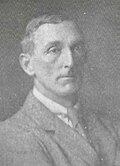Electoral history
The result of the last General Election;

| Party | Candidate | Votes | % | ±% | |
|---|---|---|---|---|---|
| Liberal | Frank Gray | 12,311 | 56.1 | −2.9 | |
| Conservative | Robert Bourne | 9,618 | 43.9 | +2.9 | |
| Majority | 2,693 | 12.2 | −5.8 | ||
| Turnout | 21,929 | 83.5 | −0.3 | ||
| Liberal hold | Swing | -2.9 | |||
The 1924 Oxford by-election was a parliamentary by-election held on 5 June 1924 for the British House of Commons constituency of Oxford.
The seat had become vacant when the Liberal Member of Parliament (MP) Frank Gray was unseated on petition on 14 May, after his agent had falsified the account for his expenses at the 1923 election. [1] Gray had held the seat since the 1922 election.
The result of the last General Election;

| Party | Candidate | Votes | % | ±% | |
|---|---|---|---|---|---|
| Liberal | Frank Gray | 12,311 | 56.1 | −2.9 | |
| Conservative | Robert Bourne | 9,618 | 43.9 | +2.9 | |
| Majority | 2,693 | 12.2 | −5.8 | ||
| Turnout | 21,929 | 83.5 | −0.3 | ||
| Liberal hold | Swing | -2.9 | |||

All three candidates were former Oxford Blues enabling the popular press to dub the campaign 'The Battle of the Blues'. [3]
Former Liberal MP Frank Gray, despite being barred from standing, was still very popular in the constituency and he was active in support of Fry throughout the campaign. During the campaign Fry advocated the introduction of equal opportunities for women, the imposition of responsibilities on the fathers of illegitimate children and the introduction of a tax system that would give privacy and independence to married women. [4]
The result was a gain for the Conservatives.
| Party | Candidate | Votes | % | ±% | |
|---|---|---|---|---|---|
| Conservative | Robert Bourne | 10,079 | 47.8 | +3.9 | |
| Liberal | C.B. Fry | 8,237 | 39.1 | −17.0 | |
| Labour | Kenneth Lindsay | 2,769 | 13.1 | New | |
| Majority | 1,842 | 8.7 | N/A | ||
| Turnout | 21,085 | 80.3 | −3.2 | ||
| Conservative gain from Liberal | Swing | +10.5 | |||
Bourne would hold the seat at the following General Election later in the year.